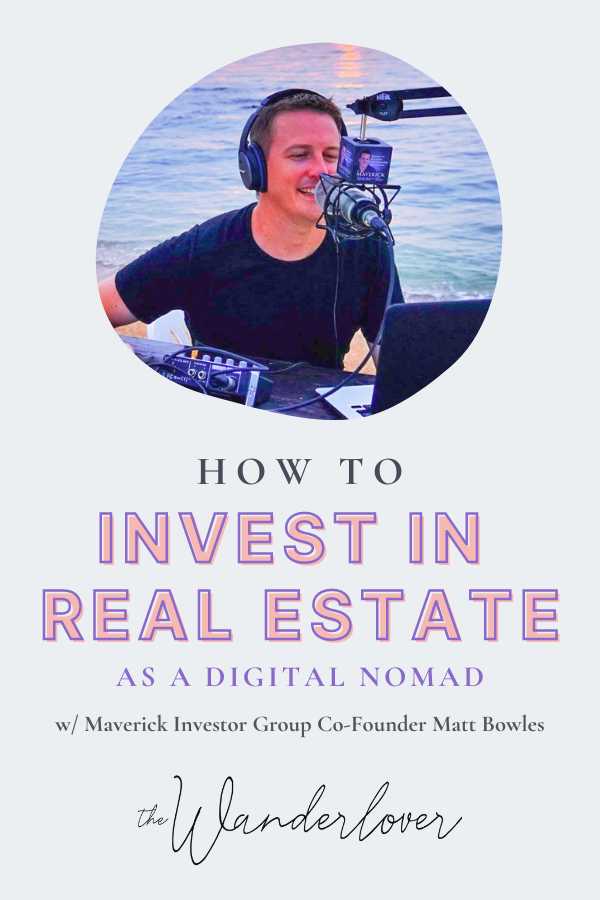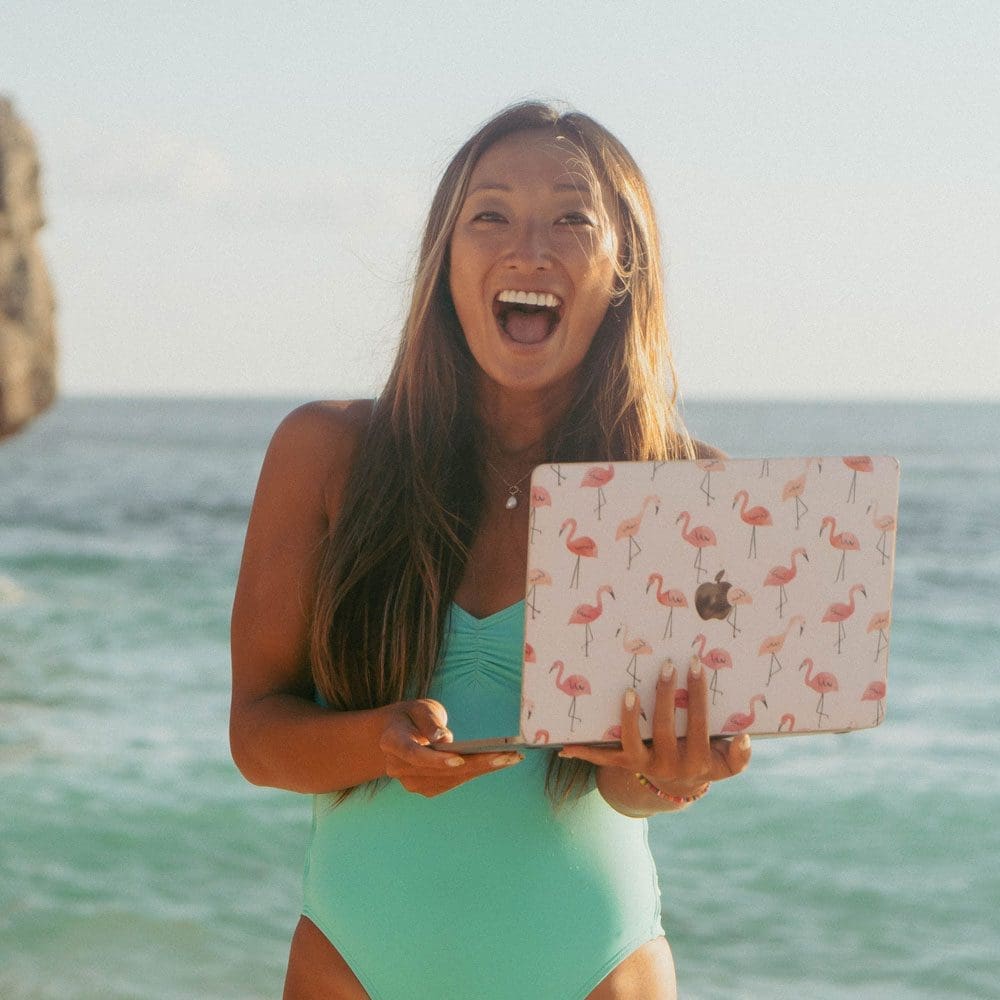Tune in or read the blog version below!
Free Resources: https://themaverickshow.com/wanderlover
Quick Links
✧ Join The Wanderlover Coaching Group
✧ Download Your FREE 0 to $100K Game Plan
Hello everyone. We have a really special episode for you this week.
We are interviewing Matt Bowles, who co-founded Maverick Investor Group in 2007 and helps people buy cash flowing rental properties in the best U.S. real estate markets regardless of where they live.
Matt and his co-founders have helped individual real estate investors buy over a hundred million in residential investment properties across 15 US states. He has been a full time digital nomad since 2013, has been to over 80 different countries. He is also the host of The Maverick Show Podcast. Welcome to the show, Matt!
Matt:
Danielle. So excited to be here. Thank you for having me.
Introduction
Danielle:
I am so excited to dive into all things real estate, podcasting, travel taxes, as I’m actually looking to buy my first real estate in investment property in the US as a Nomad. But to start off, as I know you travel a lot. Where in the world are you right now?
Matt:
So I’m actually doing a swing through the US at the moment. I spent about seven months on the continent of Africa in about seven different countries. And then I did a swing through Portugal. So I have some friends there and now I’m actually doing a swing through the us. I’m seeing friends and family. I’m gonna see my sister and her kids next week. How
Danielle:
Cool. Where in the us?
Matt:
So I’m in Ashville, North Carolina, in the Blue Ridge Mountains right now recording this.
Danielle:
Is that where you’re originally from?
Matt:
It’s not where I’m originally from, but my parents have actually moved here and chosen this as their retirement destination. And so I tend to come through at least once a year to visit them and say hello. And then my sister actually lives with her husband and their kids up in Vermont. And so we’re all gonna do a little bit of a road trip next week and and kind of go up there and hang out. So yeah, I tend to swing through the US about probably once a year. My average, I would say I usually spend about a month in the US and then probably about 11 months traveling around the world.
Danielle:
Yeah, very similar to my story. Is it because of FEIE?
Matt:
That is one reason. That is one reason. Absolutely. And then the other reason is just because, you know, I, you know, and I can adjust that as well, right? Like if I wanted to spend more time, I could do more time either way. But for me that works. That’s a good quality amount of time to spend with the family. And then I’m able to spend the rest of the year just sort of hanging out around the world, whether it’s going to conferences and community events and seeing Nomad friends, or whether it’s going to new countries and you know, living more locally or whatever it is. I can sort of mix that up.
Matt’s Story
Danielle:
Yeah, for sure. It’s all about that freedom. And I think what’s really incredible is you co-founded Maverick Investor group in 2007, and you started traveling full-time in 2013. So you basically were a Digital Nomad before the digital Nomad term became trendy.
Matt:
I got very lucky with a particular piece of timing Danielle, which you’ll be familiar with, which was that in 2007 I was working in an office job, all that. And then one day I unexpectedly got fired from my job and I said, what in the world am I gonna do now? And I said, you know what? Instead of applying for another job, I am going to start my own business and try the entrepreneurial route. Mm. And then I said, wait a minute, there’s only one problem with that. I have no idea how to start a business. And so what I literally did on the same day is I drove to the bookstore. I was in LA at the time, that was my last base. I was in LA for seven years before I became a Nomad. And I was in LA at the time and I, if anybody knows LA, I drove to the Barnes and Noble bookstore at The Grove and I just walked in and I started reading business books.
Matt:
And every day I would just go to the bookstore and I would just sit there and read business books. I wasn’t buying them Danielle, I didn’t have a job. I would just sit there and read them. And fortunately one day I walk in, the first thing I would do is I’d look at the new book section in the business section. Yeah. And there was a brand new book one day in 2007 called The Four Hour Work Week by some 29 year old kid nobody had ever heard of by the name of Timothy Ferris. And I picked it up and I read the back of it and I said, that’s what I’m reading today. I read it the day it came out and I said, wow, that’s what I’m doing. Right? Oh
Danielle:
My God, I love that.
Matt:
Yeah. And so then it was just about, okay, what business am I doing? Right? Because now I’m like, all right, here’s the blueprint, right? The location independence is what I want. What am I gonna build? And as it happened, I had experience in buying rental properties cause I had been doing that while I was working at my job buying rental properties. I had been buying some out-of-state rental properties and then my friends were coming to me and they were like, dude, how are you buying those rental properties? Can you help us buy rental properties too? I was like, sure you guys can just buy the same stuff that I’m buying. Like I’ll show you how to do it. And what I realized is I was helping my friends buy real estate is that the real estate brokers that were helping us to buy these out-of-state rental properties were getting paid a commission on all the deals that we closed, but we weren’t paying it.
Matt:
And the reason is because in the United States, the seller pays a hundred percent of the real estate brokerage fees, right? And so I was like, wow, this is incredible. If I could just start a real estate brokerage, I could literally just keep helping my friends buy real estate, charge them nothing, and all of a sudden get paid and have a business out of it. I was like, that’s the perfect business model for me cuz I don’t like selling stuff. This is perfect. And so that’s what I ended up doing. Now when I got into it, I realized, oh man, you know, I don’t have all the skills required to start a business. So what I did is I reached out and I recruited two business partners that had complimentary skillsets and the three of us founded Maverick Investor Group in 2007 and we’ve been running it ever since.
Danielle:
Amazing. And If, you don’t mind me asking, how old were you when you started?
Matt:
30? So that’s a really important question to ask and I appreciate you asking that. So just to be clear and give people my full background, I have no business background of any kind. My bachelor’s degree is in sociology. I have a master’s degree in international peace and conflict resolution. And almost my entire professional work experience was in the NGO nonprofit advocacy space. Cuz it was really important at work and I really believed in it and I still do. I just now can do things voluntarily and you know, and and so forth instead of as a job, right? And so I did that and that was my life path all the way up until 30. And then boom, one day this complete curve ball was thrown into my life and I was, you know what?
Matt:
I think it’s a time, this is a sign to pivot. And so I did.
Danielle:
That’s incredible. And what’s really funny is I’ve talked about Four Hour Work Week many times on this podcast. It is actually the book that sparked my desire to build this location independent lifestyle for myself too. I read it a bit later. So it’s just so fascinating that you were one of its first readers because I truly believe it’s just transformed so many people’s lives.
Matt:
Yeah, it was absolutely amazing. I immediately then bought two copies of it, sent ’em to my business partners, was like, read this book right away and then let’s use this to have our further discussions about what we’re building. So yeah, it was amazing timing. I got very lucky.
What Is Maverick Investment Group?
Danielle:
So what exactly is Maverick Investor Group and what services do you currently provide? Has it shifted over the years and what does it look like now?
Matt:
So we have had one niche specialty since founding our company. Wow. In 2007 that we have honed and refined and focused on the entire time. And that is helping regular individual people just like you, just like your listeners, to buy cash flowing, what we call turnkey rental properties in the best US markets from anywhere in the world. And basically what that means is that these are residential, so they’re single family homes, sometimes two to four unit properties, anything above four units is considered commercial.
Matt:
Okay? So we’re talking residential only. And when we say turnkey, we mean that they’re either brand new construction or they’ve been fully renovated and they have a long term tenant in place. Wow. On a lease paying rent. So that you cashflow on the day that you close it is what’s called a performing property. And it has professional local property management in place when you close so that you have a professional company who’s collecting the rent, handling any maintenance calls, dealing with the tenant so that you don’t have to be the landlord, you don’t have to be the rehabber and you don’t have to live near the property.
Matt:
Which means number one, obviously as a digital Nomad you wanna be moving around and not living in one place taking care of her property. But it also means that you have the ability to buy in the most Investor advantaged real estate markets. Even If, you don’t live in those markets, right? So yeah, when people think about buying stocks, for example, right? You’re gonna buy a stock in the company that you think is gonna perform the best. You don’t care if that company has its corporate headquarters in your hometown or any of that other stuff. You’re just like, I want to put my money in what I think is the best investment. So what we wanted to do was give real estate investors, and when I say real estate investors, I just mean regular people that are looking to buy real estate.
Matt:
A lot of our clients, it’s their first property they’ve ever bought. It’s, you know, they might be heavy into cryptocurrency or stocks or this or whatever. They’re like, you know what, let me just diversify a bit and get a rental property. Right? So for anybody that’s interested in a rental property, the advantage that we want to give them is one, the latitude to buy in the best markets and not be restricted to buying their local area. Number two, the ability to buy turnkey, which means that you’re really leapfrogging over all of that upfront risk of buying a distressed property and then trying to stabilize it and getting no cash flow during the renovation period. And then maybe the renovations go longer than expected, maybe they go over budget, maybe you don’t rent it for as much as you thought you were gonna rent it for it.
Matt:
You jump over all of that risk because you’re able to evaluate and assess and do your due diligence on all of those things before you close. So that you know, by the time you close, boom, you know exactly what your numbers are gonna be. You know exactly what your cash flow is gonna be and you start getting money in your bank account on the day that you close.
Danielle:
Wow, I honestly knew nothing or I didn’t know that this market existed.
What Is An Investor Advantaged Market?
Danielle:
You mentioned being in Investor advantaged markets. What exactly does that mean and how do you tell if a real estate market is Investor advantaged?
Matt:
Great question. So in the United States, it’s a massive country that has a lot of different real estate markets in it. It’s not one real estate market. Okay? So there are some markets like San Francisco and Manhattan that have insanely expensive real estate that you’re not gonna be able to rent for enough money. Yes. To make that really sensible as a cash flowing investment. Okay? So the first thing you want to do high level is look for what we call price to rent ratios. How much can you buy it for? And then how much can you rent it for as a percentage of what you bought it for?
Matt:
Okay. Often called the rent to value ratio If you will. Okay. And so you wanna look at markets that are optimized for that. It is definitely not gonna be California, New York City, those types of markets. Okay? It’s going and, and to be honest, the these markets oftentimes shift over time. But for example, while we’re talking, some of our most popular markets are the more Midwestern markets, places like St. Louis, Kansas City, Indianapolis, Cleveland. Now these are markets with strong economic indicators. They have lower than average unemployment, they have job growth, they have a lot of these positive economic indicators, but the price to rent ratios are significantly more advantageous in these types of markets.
Matt:
And so then they oftentimes have lower property taxes as well and things like that, right? So that when you actually look at all of your numbers, you’re like wow, the cashflow, the return on investment for these particular markets is significantly better. So I’ve got a lot of clients that live in LA or San Francisco or New York. Yeah. But they buy out of state rental properties because for the price of one property in San Francisco or Manhattan, you can buy 10 or more properties in these Midwestern markets and you can get significantly better returns on your investment.
Danielle:
Yeah. And you have property managers in all of these markets.
Matt:
Yeah. So every single one of these is a turnkey buying opportunity. So what we do, and to give you just a little bit of insight on how we set this up, we have relationships in each of these markets with separate businesses independently capitalized, that are local market experts that specialize in acquiring the distressed real estate, renovating it with their own construction crews. They’re doing this at scale. So they’re buying all their materials in bulk, they’re running their own construction crews, they are getting access to off market properties that other people won’t be able to get cuz they’re buying in bulk, et cetera, et cetera. Right? So they have all of these economies of scale and advantages built in.
Matt:
And then what they do is they’re the ones that are stabilizing the properties and then they offer them to our clients through Maverick Investor Group as a private off-market buying opportunity. So the types of properties we’re able to get our clients access to is not gonna be available through a local real estate agent, for example.
Creating A Location Independent Business Model
Danielle:
Wow. I know you are often abroad. Is your team on the ground there with them as well?
Matt:
So the way that Maverick Investor Group set up our business model and our role in this entire process is so that our team can be a hundred percent location independent where and work from wherever they want. Okay. Because the roles that we play do not require any kind of specific geographic presence. Okay? So our staff that works and builds relationships and has video calls with each one of our clients and talks about your real estate Investing goals and your buying criteria and answers your questions and gets you qualified for financing, that person doesn’t need to be in any one particular place.
Matt:
Our contract to close coordinator, you know, who does the contract stuff and all this stuff, she doesn’t need to be in any one particular place, right? Yeah. So what we did is we set up our role to be fully location independent. What we do is we partner with other companies, right? Separate companies that are obviously on location, obviously your property management company is gonna be local and they’re gonna be going over to the house and you know, taking care of it and all that kinda stuff. That’s obviously a local company. So what we Maverick do is we partner with local companies that are on the ground buying, renovating, managing, doing all that stuff. And then they play their role, right? In terms of creating these off-market buying opportunities in these Investor advantaged markets.
Matt:
And then our role in the process is to build the relationships with the real estate Investor buyers, help them to get on track to build their portfolio of cash flowing rental properties over time. Help them to select the right markets, walk them through the whole process, support them and give them the resources to conduct their independent due diligence. You know, have the home inspected, have the appraisal, you know, verify all these things. Like we walk them through all of those things and we can do that from anywhere. And one of the things about this business model that we really liked from the beginning, and I’ll I’ll tell you this, is that we didn’t only create it so that we could be location independent and all of our staff could be location independent. That’s one reason.
Matt:
But the other reason that we created it is in the interest of our clients. And, and what I mean by that is, normally, you know this, a real estate brokerage is not a traditionally virtual category of a business, a regular, when you think real estate agent, this is somebody who is licensed to sell real estate in one particular state. They live in one particular city and all the real estate that they have access to is just in their city. So If, you call up a real estate agent who’s working now from fill in the blank city, you can put any city in there and you’re calling up and you say, Hey, is it a good time to buy real estate in your particular market versus another market? Of course they’re gonna say, yes, it’s a great time to buy real estate in my market cuz it’s all they have to sell.
Matt:
So the regular real estate agent model is figuring out what product is available for you to sell and then retrofit your marketing materials to try to sell that. We flipped that upside down and we said we wanna be able to put the buyer first, our real estate Investor clients first and really actually be able to help them to buy in different markets as the most Investor advantage. Markets change over time. So 10 years ago, our most popular markets were very different from the word today, right? Coming out of the great recession, you know, in oh nine, 2010, totally different markets. We were helping our clients buy it. Back then it was like Phoenix, Arizona and Atlanta, Georgia and Houston, Texas, and these kind of markets today, those markets have gone up so much in value and the, and the rents have not kept pace with the price increases.
Matt:
So you’ve got this process of yield compression and people that bought then did great, but today it’s more advantageous to buy in other markets. And so our business model allows us to help our clients buy in the most advantageous markets at the time they’re ready to buy. And a traditional brokerage cannot do that.
How To Reverse Engineer Traditionally Location Independent Services
Danielle:
Yeah. And it’s so important, what you mentioned about relationships, cuz as I’m looking at different markets across the US what is really lacking as I am based abroad is the relationships that I’m capable of forming and who I can trust. So I just love how you have such a wealth of experience and knowledge navigating this remote first lifestyle and business and then fitting everything that you need around the US and getting all of your teams in place.
Matt:
Yeah, I mean that’s the advice that I give to entrepreneurs all the time, right? Because people are like, wait, you run a real estate brokerage and, and you travel the world. Like how does that even work? And one of the amazing things that I find is, you know, as I’m hosting the Maverick show and I’m interviewing other remote entrepreneurs that I’m like meeting around the world in these these random places. And I’m like, wait, you do what kind of business? I mean, you know, I’ll get in a conversation with somebody and it’ll be like, oh, I run a architectural design company and I work for these Fortune 500 companies and I designed their space. And I’m like, how are you traveling the world full time and having wine here with me? I was like, let’s turn these microphones on and talk about that. Or you know, I met somebody in Kenya, I was in Nairobi for a month, and she’s like, oh yeah, I run this business in the United States.
Matt:
It’s a live events business. I have a hundred thousand paying customer attend my live events in the United States every year. And I’m like, how are you traveling the world here with me in Kenya and running this business remotely? Let’s turn these microphones on and talk about that. And people ask me the same question like, dude, how are you running a real estate brokerage? And so the what I tell people is, listen, whatever business you want to do, just reverse engineer it and think, okay, what are the sort of traditional stumbling blocks or perceived obstacles that you think would not allow you to make this particular business location independent? And then think creatively about how you could overcome those stumbling blocks.
Matt:
And in our case, for example, as I mentioned, it was like, okay, well we’re not actually gonna do the property management in house in inside of our company. We’re going to partner with other companies that can do that piece of it. The piece of it that we’re gonna do is the stuff that we can do remotely. And that’s what I give the advice to a lot of entrepreneurs because when you think about a lot of businesses that aren’t traditionally virtual, there’s actually oftentimes a way you can make them virtual.
Danielle:
Yeah. And I think the opportunity is there. You really have to be a forward thinker and not just see what has already been created or what has already been done. This is when you can really tackle these with web three, with all the new technologies because it can be applied to each advancement that we’re seeing in such rapid time.
Matt:
A hundred percent.
Owning Real Estate In America
Danielle:
My question for you now is, do you own your own real estate investment properties in America?
Matt:
Yeah. So that’s actually how the whole business started, right? Because what I did is when I was working at a full-time job, I was in the nonprofit advocacy space, as I mentioned, right? So I was like, all right, I’m not gonna make a huge amount of income ever in this particular field, so I better learn how to, you know, invest, right? So what I did is I bought my very first property when I was working actually in Washington DC and I, what I did is I bought a four bedroom house and I decided to rent three bedrooms to friends of mine. So all of a sudden I had three streams of income, right? And I was living in this house and the craziest thing happened, Danielle, the very first year of owning that house, the house appreciated in value more than my annual salary at my job.
Danielle:
Wow. Congratulations.
Matt:
I was like, wait a minute, this is crazy. And so then I was like, how can I repeat that? And so then that’s when I just started reading everything I could read about real estate and I started buying out-of-state investment properties. I did a cash out refinance of that property, right? Cause I had that equity from the appreciation. Yeah. And then I started buying other properties in other markets and that’s when my friends started coming to me and they’re like, dude, can you help us to do that? And I was like, sure. And that’s where that whole story led to the founding of Maverick because people were already coming to me asking me how can I help them to buy these properties? And so it was really just me continuing to do what I was already doing, seeing that there was a demand. But I just bought a property this past year in one of our most popular markets of the year.
Matt:
And my business partner bought one for her personal portfolio there as well, which was in St. Louis, Missouri. And so it’s been really fun because a bunch of our clients like, oh man, I’m buying one on the same street as you are in St. Louis and stuff like that. So we have some great, we have some great conversations with our clients and stuff like that. But you know, we, we wanna work with every single person on a very individualized basis. And so maybe St. Louis is the right market for somebody. Maybe there’s a different market that’s better. And so the process though is just to bring folks in, do the video consultation individually one-on-one. We get to know every single one of our clients personally, really understand what are their goals, what’s, you know, what are, what are their buying criteria and all that kind of stuff. And then we really lay out a customized path for each person where we can support them along the way.
What Makes A Good Investment Property?
Danielle:
I love that. I love the customized approach. I love how you’ve been doing this for so many years and probably you’ve seen so many different trends and different phases of this, what would you say makes a good property in the eyes of you and your team as everything is changing. And as you know, different markets are emerging.
Matt:
So the secret to real estate Investing is to make your money when you buy and not to speculate on future home price appreciation. And so one of the very unique things about residential investment property that makes it very different from other asset classes is that instead of a normal investment where you might, let’s say buy a stock or you might buy some cryptocurrency or you might buy whatever it is and you’re just kind of hoping and praying it goes up in value, right? Speculative investment. So If, you buy a stock and it goes down in value, there’s not a whole lot you can do about that, right? If it does go up in value, well then now you’ve gotta sell it, pay your capital gains tax and hope that whatever’s left over it beats the rate of inflation to make money in real dollars, right?
Matt:
That’s kind of how it worked. Now sometimes you might have a separate stream of income, you, you might have a dividend paying stock or you could stake your crypto or something like that. Maybe there’s two streams of income there. But when you buy and hold, not flip, and you hold residential investment property, it actually activates five profit centers that work for you at the same time, cuz you’ve got your cashflow If you bought, right? You’ve got your cashflow coming in. You’ve also got your potential for Homer price appreciation and build equity that way. But If you bought, right? Your tenant’s rent is covering all of your expenses in addition to your principal and interest Mortgage payment. So what’s happening is your tenant is actually paying down your Mortgage, right? So If, you hold this property for 30 years, let’s say, and it doesn’t go up in value, a single dollar.
Matt:
It’s never happened in the history of real estate. But let’s just for this example, say that that happened to you, well guess what? Your tenant would’ve paid off your entire property. You would’ve built all that equity, you’ve owned it free and clear anyways without any market appreciation, which is why it’s a separate profit center. Yeah. The other thing that gets activated is the tax benefits. Okay? The government wants to heavily incentivize you to provide housing for your fellow citizens so that they don’t have to do it. And if you’re willing to do that, they will give you heavy tax incentives, right? When you hold residential investment property, it’s the most tax advantaged asset class in the United States bar none. They allow you to depreciate the structural value of your property, even if it’s going up in value.
Matt:
Can’t do that on a primary home, but you can do it on a rental property, right? When you go to sell this property, let’s say it doubles in value and you sell it down the road If, you reinvest those proceeds into other properties and do what’s called a 10 31 exchange, you can indefinitely defer all of the capital gains tax and you can keep doing that until death. At which point the basis resets your heirs inherit the property and nobody ever owes that capital gains tax. So there’s incredible benefits like that. And the least understood one, which is really important right now, is that when you buy and hold rental property, you can actually profit from inflation. Because when you hold a rental property, home prices rise with inflation.
Matt:
Rents also rise with inflation. And If, you borrowed a 30 year fixed rate Mortgage, you borrowed that money in today’s real dollars, but you’re paying it back in future diminished nominal dollars that are worth less than the ones that you borrowed. Mm. So what we normally think of inflation as super insidious, because If, you got your money in a bank account, it’s just destroying your wealth, destroying your buying power. But If, you take that money outta the bank account, put it into a rental property, now you’re on the other side of the inflation equation and you’re set up to profit from inflation. And so to answer your question, as long as you buy, right? Yeah. From the beginning, you don’t need to speculate because all of these profit centers start kicking in the day that you close.
Matt:
And if one of them doesn’t perform in the year, in the first year or two as much as you thought it would, the home prices don’t go up as much. They stay flat, they dip a little bit. None of that impacts you at all cuz you’re holding this for a long time. You’ve got your cashflow coming in every month, you’re taking your tax benefits and, and you’re doing all of that. So the key is make sure you buy right from the start. And part of that is buying in the right market. Part of that’s buying in the right neighborhood, and part of that is buying the right house and all of that is what we talk you through.
The Best Lending Strategies
Danielle:
That is such amazing advice, especially for people like me who are just starting out. When you first bought your first few properties, did you go to traditional lenders or how has your lending strategies changed over time?
Matt:
Yeah, so there’s a couple different lending strategies. The most advantageous type of loan that you can get is what’s called a conventional loan. That means your, you know, usually you need to either, let’s say be an American or have an American credit score to get the most advantageous terms, right? The lowest money down, the lowest interest rate, that kind of stuff. If you’re a foreign national If, you are buying in a, you know, a self-directed retirement plan or you’ve got, you know, any number of other situations where you’re not in the most advantageous lending category, then there’s steps out from that, right? There’s private financing and various different types of non-recourse asset-based lending, right?
Matt:
So for example, this property I just bought in St. Louis, Missouri, I bought it inside my self-directed retirement plan. And so I can’t get a personal loan for that because the, the property’s not in my name, it’s in my retirement plan’s name. So they need to lend just to, based on the property, not based on the individual. Okay? So that’s gonna be a little bit more money down, a little bit higher interest rate, but can still be a very advantageous investment, right? And so that’s another thing that we do when folks come in, is we have a whole stable of preferred lenders in each of these categories, right? So we’ll talk to you about, you know, your situation and based on that, we’ll introduce you to these lenders who at no cost to you can pre-qualify you, let you know exactly what you qualify for, which category of loan you can get, and then you’ll know the interest rate, the closing costs, how much money down.
Matt:
And from there we can work with you on using that to select the property that would be the best fit for you.
Danielle:
It truly sounds like a completely done for you service.
Matt:
Yeah, we, we, we, you know, that’s the whole idea, right? We want to be your resource for this. And we have all types of other adjacent professionals, whether they’re lenders or you know, people that you wanna start an L L C, like an entity in which to hold the property. And you want to have all, we have all of these vendors, you know, right there in our Rolodex and you know, they help our clients do this stuff all the time. So whatever it is that you need, we can be your resource hub for helping you to do that.
Danielle:
Amazing. Well, I’m definitely going to link all of that in the episode description.
Hosting a Digital Nomad Podcast
Danielle:
Now I know you also have a podcast called The Maverick Show. Can you tell us a bit about what it’s about and when you started it?
Matt:
Absolutely. So I became a full-time digital Nomad in 2013. I’ve been traveling the world with no base since then. And what I found is as I was traveling around the world, I just started, you know, this, you know, I just start bumping into all of these people that are doing unbelievable things. They have incredible stories. Like I would just find myself, you know, I’m like a rooftop in Bangkok having a discussion with someone. They would be telling me an unbelievable travel story and then I would be like, wait, okay, so what do you do? Like, how are you traveling the world full-time? How are you financing that? And then they’d tell me about the business that they’re running out. I would be like, how are you doing that? Like, and so I get, I started getting into so many of these conversations with these brilliant, fascinating people that had extraordinary travel experiences and stories, and they were building these unbelievable businesses.
Matt:
And I was like, I’ve got to start a podcast and start recording some of these conversations. So in 2018, I launched the Maverick Show and every single week since then, I have been interviewing today’s most interesting location, independent entrepreneurs and world travelers. My average guest has been to at least 50 countries. We’re usually doing these interviews over a bottle of wine somewhere around the world talking about the place that we are, and then kind of sharing a little bit about some of their travel experiences, their recommendations for their favorite places. And then we go into how in the world did you build this business? Like tell us how you’re running a location, independent business that’s getting a hundred thousand paying customers in a country that you’re not even in to your live events or like whatever it may be, right?
Matt:
And so we sort of do a deep dive into that, but a lot of my guests have a particular specialty, an area of expertise. Like I just interviewed a guest who again has been to 50 countries and travels around the world, but she’s a professional paid international keynote speaker. And we went deep into her expertise about how do you get there for business owners that want to add that particular skill and that particular stream of income to their repertoire with whatever they’re doing in their business. What are the steps to becoming a public speaker getting on stages, then becoming paid, then becoming paid higher and higher and higher. Yeah. And you know, incorporating that into both your travel life and your business, right? That’s one example. That’s, you know, a recent episode, but in all of the episodes it’s like, okay, let’s take this person’s skillset, go deep and pull out actionable tips that anybody can use to improve their situation if they wanna pursue this skillset.
Danielle:
Yeah, I love that. I love that it’s inspirational and you give the actionable tips. So if this really resonates with what you are trying to learn on your online business journey, please give the Maverick show a listen. I will link your Podcasts along with all of your links in the episode description. Thank you so much for being on the show, Matt, and sharing your wealth of experience and knowledge.
Matt:
It was my pleasure to be here. And if your folks wanna come into my world, first of all, yes, wherever you’re listening to this podcast, just look for the Maverick Show with Matt Bowles and you can check it out there. Also, I wanted to offer a special gift, if I may, Danielle just to the course Wanderlover community. I’m gonna put up a special page. It’s themaverickshow.com/wanderlover. It’s for anybody that’s heard me on this podcast and there is gonna be a whole bunch of completely free stuff for you. So If, you’re interested in the real estate Investing stuff, I’ve got free content on how to buy investment real estate as a digital Nomad. We’ve got a free consultation offer, never costs money to work with us.
Matt:
As I mentioned, sellers pay all the commissions in real estate. You pay nothing. Happy to do a video consult, answer your questions, that registration is there and I’m gonna just gonna throw in some other fun Nomad stuff. I do a minimalist packing training video and like some other cool Nomad stuff. So I’m gonna put a whole bunch of stuff. It’s all free. Just go to the Maverick show.com/ Wanderlover – and we’d love to get to know you and invite you into the Maverick community.
Danielle:
Thank you so much. That is so generous. Alright guys, see you in the next episode.
If you’ve enjoyed this episode, it would mean so much if you could leave a review on Apple Podcasts. This helps us spread The Wanderlover mission to those who need a dose of inspiration today.
Share On Pinterest!

Read Next
How I Travel for Free Using Credit Card Points
What Time Freedom, Location Freedom, and Financial Freedom Mean To Me
Top 5 Digital Nomad Destinations (for Surfers)!
Attracting Your Perfect Life Partner As a Nomad
Holafly eSIM Review: Best eSIM for International Travel
SafetyWing Review: Best Travel Insurance for Digital Nomads
5 Ways To Travel Sustainably As A Digital Nomad












